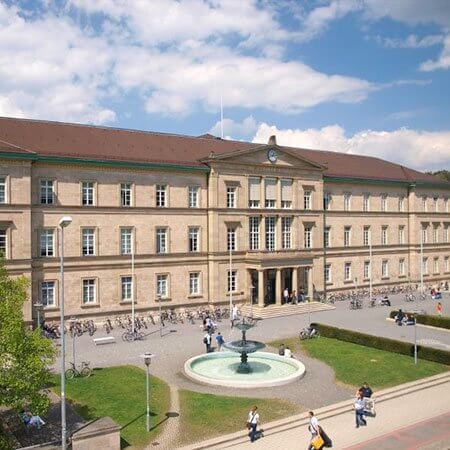Lumpectomy and Lymphadenectomy by Metastases to Lymph Nodes for Breast Cancer treatment in Germany
Treatment prices are regulated by national law of the corresponding countries, but can also include additional hospital coefficients. In order to receive the individual cost calculation, please send us the request and medical records.
Breast Cancer Treatment in Germany
- Diagnostics
- Reconstruction with an expander or allo prosthesis
- Diep-flap plastic reconstruction with own tissues
- Reconstruction with own tissue or implant after radical mastectomy
- Radical mastectomy
- Brachytherapy
- Chemotherapy
- Radiotherapy
- Sectoral resection with flap plastic
- Proton Therapy
- Embolization or chemoembolization

Department of Adult and Pediatric Gynecology, Mammology, Obstetrics
According to the Focus magazine, the Department of Adult and Pediatric Gynecology, Mammology, Obstetrics is included in the ranking of the top German departments specializing in obstetrics and breast cancer treatment! The department offers the full range of diagnostics and treatment of diseases of the female reproductive system, breast pathologies. Also, the specialists of the department provide a comprehensive management of pregnancy, childbirth and postpartum care for both mother and child. Key attention is paid to the treatment of female genital cancers, as well as breast cancer treatment. For this purpose, the department has all the modern therapeutic techniques, as well as its our own innovative developments by the department doctors.







Department of Adult and Pediatric Gynecology, Mammology, Obstetrics
The Department of Adult and Pediatric Gynecology, Mammology, Obstetrics offers high-precision diagnostics and effective treatment of the full range of diseases of the female reproductive system and breast pathologies. The medical facility also employs a competent team of obstetricians, whose responsibilities include comprehensive management of pregnancy, childbirth, and postnatal care for mother and baby. More than 3,000 babies are born in the department's delivery rooms annually. The department cooperates closely with the UniFee Reproductive Medicine Center, which allows gynecologists to treat female infertility together with reproductive medicine specialists. The department's gynecologists focus on women with reproductive system cancers. The medical facility is certified by the German Cancer Society (DKG) as a specialized center. The specialists also successfully treat endometriosis, one of the most common benign gynecologic diseases. In the field of mammology, priority is given to the provision of medical care to women with breast cancer. Doctors perform comprehensive diagnostics, surgical and conservative treatment, and reconstructive plastic surgery after mastectomy. The department's specialists use state-of-the-art technical resources and their professional skills to provide each patient with high-quality medical service.







Department of Adult and Pediatric Gynecology, Obstetrics and Mammology
According to the Focus magazine, the Department of Adult and Pediatric Gynecology, Obstetrics and Mammology ranks among the top German departments specializing in the provision of obstetric services and breast cancer treatment! The department offers all diagnostic and therapeutic options for patients of all ages with diseases of the female reproductive system, mammary gland, as well as provides the comprehensive pregnancy management, childbirth and postpartum care in accordance with the highest standards of modern obstetrics. One of the priority focuses of the department’s work is the treatment of oncopathology in women. All specialists have excellent qualifications and tremendous experience, and therefore they achieve successful results even in extremely difficult clinical cases.






Most hospitals use surgery, radiation therapy, and chemotherapy for the treatment of breast cancer. Additional treatment methods are not always necessary. The irradiation and chemotherapy are sometimes administered after the detection of cancer cells in distant lymph nodes.
Unfortunately, dissection of the lymph nodes sometimes leads to lymphedema – lymphatic edema. In modern hospitals, sentinel lymph node biopsy is performed, which often avoids lymphadenectomy. Instead of 10-15 lymph nodes, the doctors remove only 2 or 3.
What is lymphadenectomy?
Lymphadenectomy (lymph node dissection) is a stage of breast-conserving surgery or mastectomy, the essence of which is the removal of at least 10 lymph nodes.
The main purpose of the lymph node dissection is the axillary node biopsy. The doctor needs to check whether cancer cells have spread here from the axillary lymph or not. Another purpose of lymph node dissection is the therapeutic one. The doctor removes the visible foci of breast cancer and reduces the risk of recurrence.
In a breast-conserving operation (lumpectomy), the doctor dissects the node from an additional surgical access. A skin incision is usually performed for this purpose. In some hospitals, lymph node dissection is performed endoscopically (through small punctures), but such lymph node dissection is complicated and time-consuming, therefore it is not applied widely.
In mastectomy, lymph node dissection is performed simultaneously with the removal of the breast. The en bloc removal of the breast, lymph nodes, and other tissues is usually carried out.
Is lymphadenectomy always necessary?
There are two approaches to lymphadenectomy:
- Lymph node dissection is performed in all women with breast cancer without exception. This approach has been practiced since the second half of the 20th century. It is still the main one in many countries with poorly developed medicine.
- Node biopsy is carried out. Lymphadenectomy is performed only if metastases are detected in sentinel nodes. When performing node biopsy, a woman has a chance to avoid lymph node dissection. If the sentinel nodes are clean, lymphadenectomy is not performed.
Dissection of the lymph nodes while preserving the breast
Lymphadenectomy allows the doctor to determine the stage of breast cancer. As a rule, it is easy to determine the parameters of the primary tumor, as it is possible to assess its size and configuration with the help of MRI. However it is not always possible to detect the metastases in axillary lymph. Sometimes, metastases are too small and do not lead to swelling of lymph nodes.
Node biopsy or dissection is a procedure during which the doctors obtain material for histological examination. The lymph nodes obtained during the lymph node dissection are sent to the laboratory. There even metastases of a millimeter in diameter can be found.
Breast-conserving surgery is usually performed at an early stage of breast cancer. Nevertheless, even in a small primary tumor not affecting the axillary lymph, breast cancer can be metastatic. Incision or node biopsy is a mandatory procedure for selection of the optimal cancer treatment scheme.
After breast-conserving surgery, the question of whether radiation therapy is necessary is not raised. Radiation therapy is indicated to all women without exception. Nevertheless, a number of important decisions depend on the presence and number of metastases, which have spread through axillary lymph, for example:
- Where the radiation therapy will be directed (which body areas are subject to radiation)
- Is it possible to carry out radiation therapy according to an accelerated program (accelerated partial breast irradiation)
- Necessity of chemotherapy
If no cancer cells are detected in the nodes after a dissection or biopsy, then a woman can avoid additional treatment. At the same time, the detection of metastases that have spread through axillary lymph will allow the doctors to respond adequately to the results of the node biopsy and suppress all possible sources of breast cancer recurrence.
Dissection of the lymph nodes during mastectomy
Treatment in Germany is rarely carried out using mastectomy, but sometimes this type of surgery is performed. Mastectomy is indicated in advanced and aggressive types of breast cancer. Sometimes mastectomy is preferred by women who do not want to undergo radiation therapy after surgery.
Breast-conserving surgery always requires radiation therapy, but it is usually not obligatory after mastectomy. As a rule, it is carried out according to indications. One of the indications is the detection of foci of metastasis, which have spread with axillary lymph.
Lymph node dissection is performed simultaneously with mastectomy. After dissection, the lymph nodes are examined in a laboratory. If they contain cancer cells, the course of radiation therapy after mastectomy is indicated.
Is it possible to avoid lymphadenectomy?
Lymph node dissection impairs the circulation of axillary lymph. Therefore, it sometimes causes lymphedema (lymphatic edema). Axillary lymph accumulates in the tissues and causes an increase in the volume of the limb on the side of the lymph node dissection.
In order to avoid lymphedema, the treatment in Germany is not carried out by means of dissection, but using node biopsy, if possible. Not always, but quite often, a node biopsy makes breast cancer surgery more sparing, avoids lymph node dissection, maintains normal axillary lymph circulation, and prevents lymphedema development.
What is a sentinel node?
Sentinel nodes are the first lymph nodes to which axillary lymph from breast cancer flows. This is where axillary lymph flow brings metastases primarily. Accordingly, if metastatic foci are detected during a node biopsy, they will be right here.
The problem is that breast cancer develops in different areas. Therefore, sentinel nodes can be different. To obtain information on the location of sentinel nodes, the special examinations are required. They help the doctor understand which sentinel nodes need to be removed for a node biopsy.
The information on the location of sentinel nodes is usually obtained using radionuclide method. The doctor injects a lymphotropic radiopharmaceutical into the breast cancer area. It is injected into 4-8 points along the perimeter of the tumor. After some time, the axillary lymph delivers the radioactive substance to the sentinel nodes. Areas of the radiopharmaceutical accumulation are detected prior to surgery or during surgery with a gamma scanner or tomography system.
In addition, blue dye is often used for imaging of sentinel nodes. It makes it easier for the doctor to perform a node biopsy during surgery.
Why dissection may not be required after a node biopsy?
A node biopsy gives the doctor more information about the condition. Since the sentinel node is the first on the path of the axillary lymph outflow from the tumor, it follows that:
- If the sentinel node is clean, then there are no metastatic foci in the following lymph nodes, which are located further. Accordingly, their dissection is not required.
- If a node biopsy reveals metastases, then in the following lymph nodes they may also be present. This information cannot be received by non-invasive examinations. Therefore, the doctor performs a dissection of the lymph nodes to clarify the diagnosis of breast cancer.
Not all hospitals perform node biopsy. Sometimes doctors perform a dissection during mastectomy or breast-conserving surgery. If you are undergoing treatment in Germany, you will have a node biopsy. Only if metastases are detected in them, the doctor will dissect the lymph nodes.
What is lymphedema?
Lymphedema is the most common complication of lymph node dissection. Lymphedema is the result of the axillary lymph circulation disorder. Since axillary lymph accumulates in the soft tissues, they swell, which leads to a significant increase in the circumference of the arm on the affected side.
Lymphedema may not develop immediately, but only in a few months after surgery with node dissection. It is characterized by gradual progression. Initially, lymphedema causes only mild discomfort, but in the most severe cases, it can lead to lymphorrhea (axillary lymph leakage to the skin surface), skin densification and complete loss of arm function.
Due to the risk of lymphedema, most doctors try to perform a mastectomy or lumpectomy without dissecting the lymph nodes, if possible.
Lymphedema has the following 4 grades of severity:
- Grade 1 lymphedema does not cause subjective sensations. The upper limbs are different in circumference, but the affected arm is only 5-10% bigger. Raising an arm up or wearing a compression hosiery relieves symptoms.
- Grade 2 lymphedema causes significant edema, the disappearance of the skin folds, the difference in limb circumference reaches 10-30%.
- Grade 3 lymphedema causes hand deformity, the difference in circumference with a healthy limb exceeds 30%.
- Grade 4 lymphedema causes complete loss of arm function, the development of lymphosarcoma is possible.
Although lymphedema most often develops after a mastectomy or breast-conserving surgery for removal of lymph nodes, rarely, it can be caused by node biopsy or armpit area irradiation.
If you are undergoing treatment in Germany, the risk of developing lymphedema is minimal. German hospitals use the latest, the most sparing examination techniques, surgeries and types of radiation therapy.
Why is it better to undergo breast cancer treatment in German clinics?
The treatment in Germany is not cheap. Despite the relatively high prices, many people want to undergo breast cancer treatment in Germany. Every year tens of thousands of patients from all over the world come here for receiving medical care of the highest level.
Here are several reasons why it is better to undergo treatment in Germany.
High-precision diagnosis making allows the doctor to obtain accurate information about the type of breast cancer, the location and size of the tumor, the presence of metastases in the lymph nodes.
Organ-preserving surgery. The treatment in Germany rarely involves mastectomy. Organ-preserving surgery is more often carried out. It provides the possibility of follow-up breast restoration.
Node biopsy is performed in German clinics. According to the diagnostic information obtained, a decision is made on the need for dissection of the lymph nodes. Lymph node dissection is sometimes unnecessary. Refusal of lymph node dissection allows the patient to avoid lymphedema.
Aesthetic results. Immediate or delayed plastic surgery allows the patient to regain her attractive appearance after breast cancer treatment.
Combined treatment. The treatment in Germany is usually carried out using not only surgery with lymph node dissection, but also with the additional use of radiation therapy, chemotherapy, hormonal therapy, and targeted therapy. Some clinics use immunotherapy for advanced breast cancer. The doctors obtain the information on the most effective combination of medications for drug therapy according to the results of laboratory tests.
Although the cost of treatment in Germany may be higher than in your native country, the surgery is more effective, sparing and rarely leads to the development of complications. In most cases, breast cancer is cured completely.
Diagnosis making and treatment in Germany with Booking Health
If you want to undergo treatment in Germany, you may use the Booking Health service. The Booking Health website contains the latest information about leading hospitals, doctors, and prices. You can compare the cost of treatment in different clinics and book a medical program at the best price. The specialists of Booking Health will organize a trip for a treatment to Germany:
- Selection of the clinic specializing in breast cancer surgery and a lymph node biopsy, since it allows the doctor to determine the indications for lymph node dissection and reduce the risk of lymphedema
- Reduced waiting period for breast cancer treatment in Germany and making appointment for surgery on a convenient date
- Reduced cost of treatment in Germany – the costs for surgery, radiation therapy, chemotherapy for breast cancer are lower due to the absence of additional price coefficients for foreign patients
- Reliable information about your expenses, the cost of treatment
- Communication with the hospital upon the treatment completion in Germany
- Organization of additional examinations for diagnosis making or treatment in Germany
The specialists of Booking Health provide high quality services. We will book a hotel and airline tickets for you, organize a transfer from the airport to the hospital and back.

